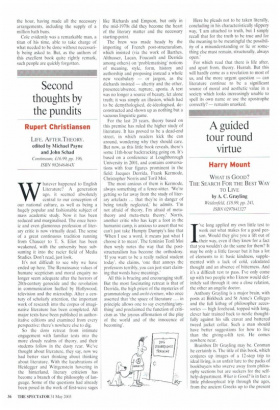Bossyboots, busybody and bread board designer
Charles Saumarez Smith
THE GREAT EXHIBITOR: THE LIFE AND WORK OF HENRY COLE by Elizabeth Bonython and Anthony Burton V& A Publications, £35, pp. 328. ISBN 1851773266 When I worked at the Victoria and Albert Museum in the 1980s, part of the sense of Manichean conflict in the operation of the museum derived from a division between the Cole-ites — those who believed that the V&A should be viewed as an instrument of vigorous public education — and those who were more in favour of the views of John Charles Robinson — that what was ultimately important was the quality and experience of the collection. But, at the time, the views of the originals in this psychic battle had not been much investigated and the only text with which it was possible to study the life of Sir Henry Cole, the founder of the V&A (apart from a spirited essay by Sir Christopher Frayling in the second volume of the V&A Album on the politics of design reform) was Cole's stupefyingly tedious official memoir, entitled Fifty Years of Public Work.
Now, at long last, it is possible to find out everything one wants to know about Sir Henry Cole in an impressively detailed, deeply researched and rather Victorian biography of him, written by Elizabeth Bonython, who slightly mysteriously owns the copyright of Cole's diaries, and Anthony Burton, himself a somewhat Cole-like figure who worked for a long time in the National Art Library, was secretary to the Trustees of the V&A, ran the Bethnal Green Museum and ended his career in the V&A's Research Department.
Cole's life makes for an absorbing story straight from the pages of Samuel Smiles. He was born the son of an incompetent military captain, was educated at Christ's Hospital, entered the service of the Record Commission as a clerk to Sir Francis Palgrave (ne Cohen) aged 15, and spent his later life as the sort of passionate, pugnacious, self-confident public servant who built the Victorian civil service into an impressive instrument of public reform.
When kicked out of his father's house because his father had married his housekeeper, Cole went to lodge with Thomas Love Peacock, who worked for the East India Company. His closest friend in his youth was John Stuart Mill, from whom he imbibed a strong dose of utilitarianism. Almost inevitably, he quarrelled with his superiors at the Record Commission, partly over an issue of pay, but partly because he was one of those infuriating employees who believed, probably rightly, that he could run the place much better than the person who had been appointed to. Having resigned in protest over a matter of principle, he arranged for a royal commission to meet under the chairmanship of Charles Buller, the reforming MP, and, between them, they arranged for the reform of the whole administration of the public records and the reinstatement of Henry Cole as an Assistant Keeper at a higher salary.
Not content with reforming the public records, Henry Cole went on in his spare time (a lot of it was spare) to help Sir Rowland Hill to establish the penny post. When the railways started up in the 1840s, he became involved in writing for the Railway Chronicle and campaigning against Brunel for the universal application of narrow gauge. He was hired by the Earl of Yarborough to help establish a new dock in Grimsby. He claimed to be the first person to design a bread board and was certainly the first person to sell Christmas cards. In the late 1840s, he began to design everyday objects under the pseudonym Felix Summerly and, perhaps inevitably, he was drawn into the circle of the Royal Society of Arts, of which he became chairman. Whatever he touched, he quickly chose to reform. He always knew how something should be run, being particularly critical of large committees on the grounds that they tended to reduce executive responsibility.
It was through his association with the Royal Society of Arts that Cole became one of the prime movers in the Great Exhibition. By now one knows exactly what to expect. There were the usual quarrels, the sense that Cole was not getting his due, that the smooth ordering of the plans for Paxton's Palace was being frustrated by a useless committee and, then, in the end, as ever, Cole comes out on top, the hero of the hour, having made all the necessary arrangements, including the supply of a million bath buns.
Cole evidently was a remarkable man, a titan of his time, able to take charge of what needed to be done without necessarily being asked to. But, as the authors of this excellent book quite rightly remark, such people are quickly forgotten.



































































 Previous page
Previous page